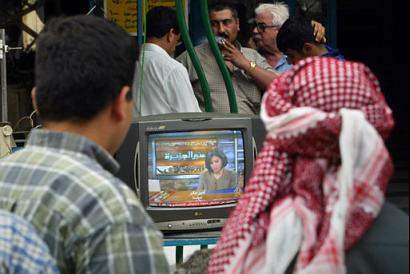Arab world now faces invasion by American TV
The Guardian - Thursday April 24, 2003
full story located at:
http://media.guardian.co.uk/broadcast/story/0,7493,942426,00.html
Washington's battle to win public support in the Arab world has begun in earnest with the first broadcasts of what officials say will become a 24-hour satellite television network aimed at changing minds throughout the region by American-style morning chat-shows, sports, news and children's programmes. Faced with allegations that the channel will be a propaganda arm of the US government the broadcasting magnate setting it up, Norman Pattiz, vowed that it would remain independent.
Iraq and the World, the prototype channel being beamed into the country from a US air force plane, began showing American evening news bulletins this week. A full-service version should be broadcasting 24 hours a day to 22 countries in the Middle East by the end of the year, Mr Pattiz, chairman of Westwood One, said.
Faces familiar to US audiences, including Dan Rather of CBS and Tom Brokaw of ABC, are appearing with their words translated into Arabic. The aim is "to counter the negative images being broadcast right now, the incitement to violence, the hate radio, the journalistic self-censorship", Mr Pattiz told the Guardian.
"Al-Jazeera likes to present itself as the CNN of the Middle East, but I think of them more as CNN meets Jerry Springer. Except people in the US find Jerry Springer amusing, and in the Middle East ... people can lose their lives over that kind of rhetoric."
Mr Pattiz's confidence that the approach can be easily exported to the world of public diplomacy is far from shared, and is derided by some as naive or counter-productive. "It's part of this enormous faith, this unquestioned faith, that when the people in the Middle East are introduced to American values and style, and look and feel, they will fall for it," said Michael Wolff, a media columnist for New York magazine. "And it's virtually unchallenged. It's almost missionary-like."
The network's planners were obsessed with al-Jazeera and the idea that it was indoctrinating a generation of viewers, said Samer Shehata, a professor of Arab studies at Georgetown University in Washington. "Think about the assumptions involved in that - that the Arabs just sit in front of TV sets and al-Jazeera just pumps this information into them?" The operation betrayed the widespread belief that "the primary problem to the hackneyed question, 'why do people hate us?' is that they don't understand us".
"A small amount of that is true, but the primary problem is policy... US policy towards Israel, towards Iraq, support for authoritarianism."

